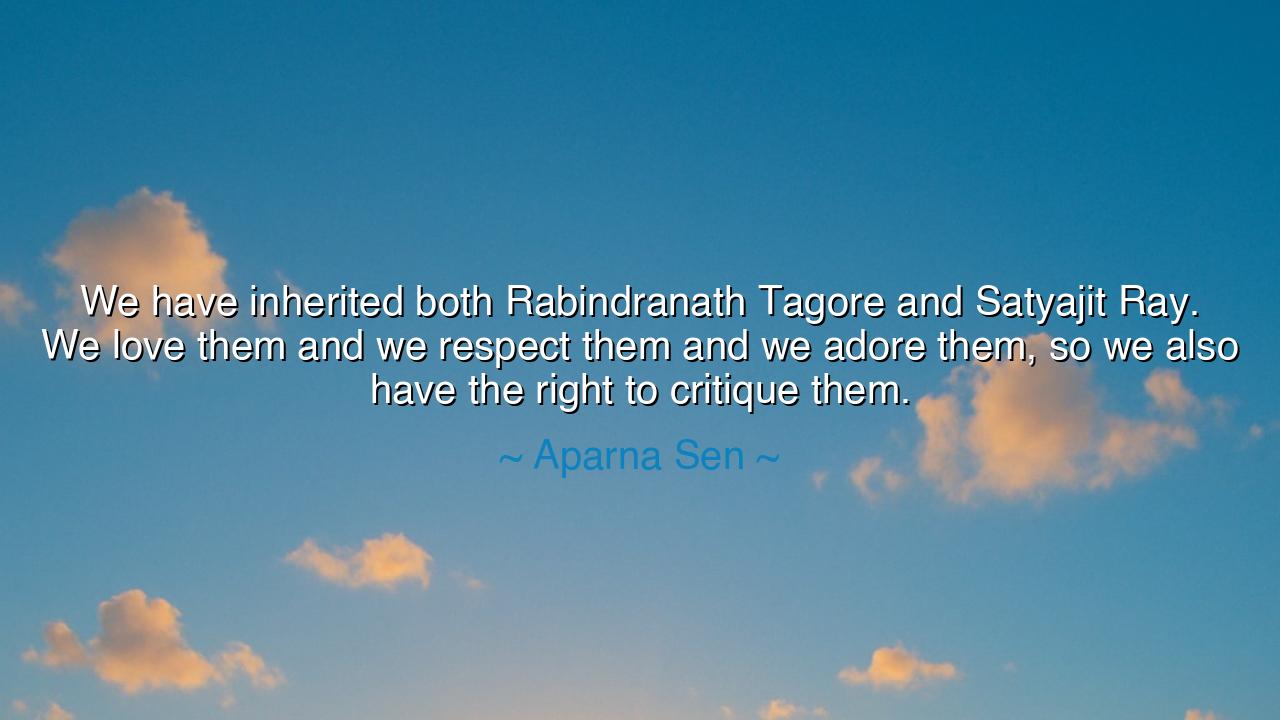
We have inherited both Rabindranath Tagore and Satyajit Ray. We
We have inherited both Rabindranath Tagore and Satyajit Ray. We love them and we respect them and we adore them, so we also have the right to critique them.






When Aparna Sen declared, “We have inherited both Rabindranath Tagore and Satyajit Ray. We love them and we respect them and we adore them, so we also have the right to critique them,” she spoke with the wisdom of one who understands the true nature of inheritance. Her words are not merely about two towering figures of Bengali and Indian culture; they are about the eternal balance between reverence and critique, between honoring the past and daring to question it. For to inherit is not only to preserve but also to engage, not only to bow in reverence but to wrestle with meaning, so that the gift of the past remains alive in the present.
The names Rabindranath Tagore and Satyajit Ray are not light ones to invoke. Tagore, the poet, philosopher, and Nobel laureate, gave India and the world songs of freedom and universality. Ray, the filmmaker, brought to life the textures of human struggle and dignity with a cinematic voice that reached across continents. To inherit them is to inherit the weight of genius, the beauty of creation, and the responsibility of guardianship. Aparna Sen reminds us that such inheritance demands more than adoration—it demands engagement, reflection, and even critique, so that their legacy remains dynamic rather than fossilized.
The ancients also wrestled with this paradox. In Greece, Socrates honored Homer as the poet of the ages, yet dared to question the moral lessons in his epics. In India, disciples revered the Vedas, yet schools of thought like Buddhism and Jainism arose in critique of them, preserving truth by challenging it. Reverence without critique becomes idolatry; critique without reverence becomes arrogance. Sen’s wisdom lies in calling for the union of the two: love and questioning, respect and evaluation.
Consider the story of Galileo. He inherited the knowledge of Aristotle, a figure revered across centuries. Yet Galileo, while respecting Aristotle’s brilliance, dared to critique him, to place the earth not at the center but in motion around the sun. For this boldness, he faced condemnation, yet his critique became the seed of modern science. So too with Tagore and Ray: to honor them is to recognize their genius, but to critique them is to ensure their ideas are not static relics, but living truths tested and strengthened by questioning.
Sen also speaks to the duty of ownership. To inherit Tagore and Ray is not only to enjoy their art but to bear responsibility for its continued relevance. Love and respect bind us to their legacy, but critique ensures that future generations can engage with them freshly, without blind repetition. To silence critique in the name of respect would be to lock their works in a museum, beautiful but lifeless. To engage critically is to keep them in the marketplace of ideas, alive and speaking to new struggles and new contexts.
The deeper meaning of Sen’s words is this: true reverence is active, not passive. When we critique what we love, we do so not to diminish it, but to deepen it. A parent corrects a child out of love, a teacher challenges a student out of hope, and a people critique their cultural icons out of desire to see their legacy remain pure and powerful. This is the sacred duty of inheritance: not blind worship, but thoughtful guardianship.
For us, the lesson is clear: in our own lives, let us honor those we admire not by silence, but by dialogue. Respect your heroes, learn from your teachers, treasure your traditions—but do not fear to question them. In doing so, you strengthen the bond between past and present, between the wisdom of those who came before and the aspirations of those who will follow. Critique, born of love, is not destruction but renewal.
Thus, Aparna Sen’s words resound as both homage and challenge. To inherit Tagore and Ray is to inherit greatness. To critique them is to prove ourselves worthy of that inheritance. Let us walk in that spirit, holding love in one hand and discernment in the other, so that the legacy of the past may continue to illuminate the path of the future.






AAdministratorAdministrator
Welcome, honored guests. Please leave a comment, we will respond soon